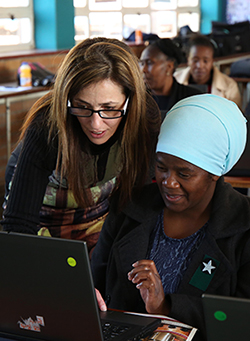Latest News Archive
Please select Category, Year, and then Month to display items
06 April 2018
Photo Rulanzen Martin
 From the left: Dr Thulisile Mphambukeli, leader of the BRICS research team that is exploring the political economy of water and food security, and her research partner, Dr Victor Okorie.
From the left: Dr Thulisile Mphambukeli, leader of the BRICS research team that is exploring the political economy of water and food security, and her research partner, Dr Victor Okorie.
A Brazil, Russia, India, China and South Africa (BRICS) delegation is to hold the 10th Annual BRICS Summit in the last week of May 2018 in Johannesburg. Dr Thulisile Mphambukeli, leader of the University of the Free State (UFS) research team alongside Dr Victor Okorie from the Department of Urban and Regional Planning, in collaboration with Prof Lere Amusan of North-West University, will ensure that water and food security is a prominent feature on the gathering’s agenda.
First, the project titled: “Exploring the political economy of water and food security nexus in BRICS and Africa” will debut at the National Institute for the Humanities and Social Sciences BRICS Think Tank Forum”.
According to Dr Mphambukeli, the key to water security is attitudinal change by means of education and conscientisation. This, she is adamant about, holds the potential to drive behavioural adjustments in the way society interacts with water.
Genetic and social approaches
Dr Okorie asserts that if strides towards reducing the demand for water were to be made, research efforts should be geared towards effecting changes at DNA level. Meaning we need to explore waterwise ways that enable crops and animals to thrive optimally.
The project also looks at social dimensions of water such as flushing a toilet. “Research activities on redesigning toilets, especially the urinal, where more than nine litres of water are used to flush less than one cubic centimetre of urine, are timely in the context of managing water and the food nexus crises,” said Dr Okorie.
Combining the genetic and social approaches would allow us to produce more with a smaller water footprint. This can be made possible by implementing precision agriculture which is about estimating and applying exact quantities of water and nutrients needed for the production of crops or the raising of livestock.
Paradigm shifting policies
Prof Amusan said the team intended to propose functional solutions that take the quality of water into consideration. Equitable production and distribution of water depends on endorsing policies of co-production between citizens, governments and the public sector. BRICS member states mutually consider water and food security as an issue of paramount significance, hence its feature on this prestigious summit’s agenda.
Digitising the Advanced Certificate in Teaching (ACT)
2017-02-06

The 100% online ACT aims to help
teachers improve their qualifications.
More information is available at
http://www.ufs.ac.za/ACTonline.
Photo: Supplied
Online learning is fast becoming the most convenient and affordable way to study. In 2016, the South Campus of the University of the Free State (UFS) became the first university in South Africa to launch a fully online course for current teachers to upgrade their qualifications; the Advanced Certificate in Teaching (ACT).
The IDEAS Lab digitisation team on our South Campus is responsible for converting the existing ACT modules from a blended format to a 100% online format. With this format all lessons and study material are available online, with no contact sessions required. The advantages of online, interactive learning far outweigh those of blended learning. Lessons are converted to videos online, which is not only more user-friendly, but students can also access the lessons repeatedly.
In addition, tutors are always available, with WhatsApp groups and the ACT Online Facebook page further facilitating the support provided. Discussions between or communication with students situated in remote areas is made possible, adding to an enriched student experience. Immediate feedback on activities serves as a diagnostic tool as well as motivation for the students.
Lesson videos are recorded at the IDEAS Lab Studio at the South Campus or onsite at various schools. Students are expected to complete a unit, which consists of two lessons, per week.
There are “think about your learning” activities after each lesson as well as “after readings” to ensure that students have grasped the material. In these and many other ways the online ACT is specifically designed to suit students’ unique needs and make their studies a satisfying and rewarding experience.